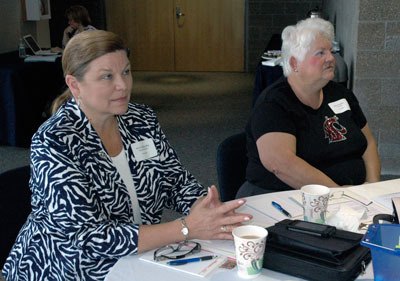ARLINGTON — The Arlington School District’s Board of Directors and superintendent met with those of the Marysville, Everett and Mount Vernon school districts on Saturday, May 11, to take a tentative new method of measuring superintendent performance out for a test drive.
Phil Gore, director of leadership and development services with the Washington State School Directors’ Association, led the school districts’ respective personnel through the six-hour training session, which included a series of simulated scenarios which tasked the boards with evaluating superintendents by applying the latest draft of WSSDA’s proposed rubric.
“I am concerned that this could be too cumbersome,” Arlington School Board Vice President Kay Duskin said at the outset of the exercise.
Fellow Arlington School Board member Bob McClure expressed a similar concern with losing sight of the big picture, due to the model’s more than 50 individual criteria, but also voiced the hope that the day could point the way to common practices between the boards.
“We all want to grow professionally and personally, so hopefully this gives us an opportunity to get better at what we do,” said Dr. Jeff Huleatt, legislative representative for the Arlington School Board.
“I’d like for this to reflect not just the Board’s input, but also what district staff and even students feel,” Arlington School Board President Ursula Ghirardo said.
Duskin responded to the case applications that followed by citing them as evidence that school boards need agreed-upon expectations and free-flowing communication between their members, the latter of which McClure agreed was a strength of the Arlington School Board.
The May 11 joint school board meeting was the Arlington School Board’s second meeting with Gore about this issue, which allowed the board members to see many of the critiques they’d offered during the first meeting integrated into the latest draft of WSSDA’s proposal.
“It’s a great elucidation of the myriad of activities that a superintendent could and should be responsible for,” Ghirardo told The Arlington Times after the May 11 meeting. “It’s a powerful tool which we’re looking to adapt to fit our district’s strategic plan.”
While Ghirardo believes the proposed rubric could inspire outside-the-box thinking in evaluating superintendents, she also feels much better about it now that there seems to be more of a built-in flexibility to allow that rubric to be adjusted for the school districts’ needs.
“It could even be an opportunity for us to further align our district’s overall strategic plans with our data-driven department plans, so that everyone’s pulling in the same direction,” Ghirardo said.







